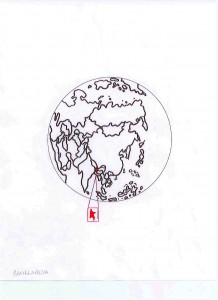BANGLADESH
A. THE COUNTRY
The People’s Republic of Bangladesh, in South Asia, is the eighth most
populous country and is among the most densely populated countries in
the world. One of the Islamic world’s only democracies, it seems a
venue for feuding between two very wealthy clans rather than a means to
improving the lot of the poor majority. Many see Bangladeshi democracy
as merely lip service to Western ideals in order to secure aid.
Corruption is endemic and deeply rooted. The country suffers from gross
over-population and periodic natural disasters (e.g. floods and
cyclones). Major sources of income are agriculture, textiles, clothing,
jute and funds sent home from Bangladeshis working abroad.
B. THE PEOPLE
The population is ~164,426,000 and the official language Bangla.
~94.3% are Bengali, ~2% Urda Muslims, ~2.6% Other South Asian, ~1.1%
Other (Tibetan/Himalayan peoples, other Asians, Westerners).
C. RELIGIONS AND CHRISTIANITY/PENTECOSTALISM
Islam is the state religion. Officially there is a religious freedom,
but this is being steadily eroded by Islamist pressure and a legal
system lacking safeguards for ethnic or religious minorities. While
most of the Bangali people are Muslim, most follow “folk” Islam – a
blend of Sufi-influenced Islam, indigenous culture and Hinduism.
Christian churches have been growing faster than the population rate for
more than 50 years. ~89.01% are Muslim, ~9.1% Hindu, ~0.66% claim to be
Christian, ~0.6% Buddhist, ~0.49% Ethnoreligionist, ~0.11%
Non-religious, ~0.02% Sikh, ~0.01% Baha’i.
In the Christian category:
~0.21% are Protestant, ~0.26% Independent, ~0.19% Catholic.
Evangelicals represent ~0.4% of the population.
Charismatics represent ~0.2% and of those <0.1% are Pentecostals.
Donna Siemens
References:
http://en.wikipedia.org
Operation World, Jason Mandryk. Colorado Springs: Biblica Publishing, 2010.

